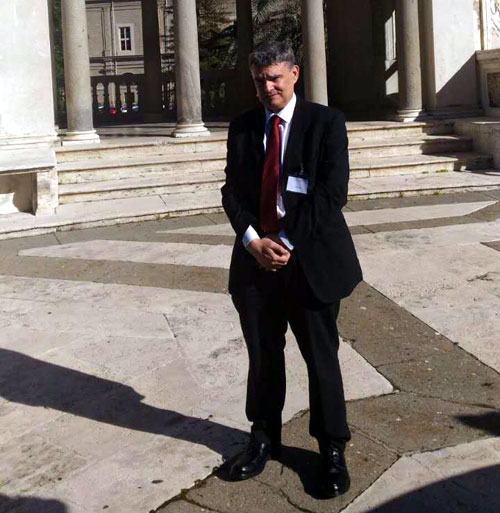澳大利亚格里菲斯大学的知名器官移植问题专家坎贝尔•弗雷泽 (Campbell Fraser)博士
国际在线报道(记者 张旭 苏毅):近日,澳大利亚格里菲斯大学的知名器官移植问题专家坎贝尔•弗雷泽 (Campbell Fraser)博士在接受记者采访时表示,中国在“反对器官贩卖全球峰会”上提出的“中国方案”是很好的,中国不仅在解决国内的器官移植问题方面取得了进步,实际上也在帮助打击全世界的器官贩卖。
据悉,弗雷泽的主要研究领域是跨国人体器官贩卖,与包括世界卫生组织在内的各国卫生官员、非营利组织以及执法部门合作打击人体器官非法交易。弗雷泽刚刚出席了2月7日至8日由梵蒂冈教皇科学院举办的“反对器官贩卖全球峰会”。
弗雷泽告诉记者,他从2008年起开始监控全球器官贩卖的发展趋势,并走访世界各地,采访了1000多名器官贩卖的受害者、购买者、中间商以及医生。“我的研究结果显示,外国人来中国进行器官移植的趋势已经停止了。我相信中国的改变是真实的,也正是因为这个原因,我觉得国际社会应该支持和鼓励中国的这种改变,携手打击器官贩卖问题,而不是听取那些试图阻止我们进步的人士的政治宣传。”弗雷泽说。
弗雷泽口中的“试图阻止我们进步的人士”是指法轮功人员,他们宣称中国政府“活摘”法轮功人员器官,并非法出售到全国各地乃至境外。
弗雷泽对记者披露称,就因为他的研究成果跟法轮功所宣称的不符,所以他个人受到了法轮功人员的多次骚扰。“去年8月,我在香港举行的第26届国际器官移植协会大会上报告我的研究成果时,他们(法轮功人员)去跟会议组织方投诉我,还跟我的雇主投诉我。每当我演讲的时候,他们就辱骂我,或者对我大喊大叫,企图阻止我说话。”
弗雷泽说,当时他还以为自己是唯一一个受到法轮功人员骚扰的人,后来发现有好几位跟他一样的学者也受到了法轮功人员的骚扰,仅仅因为他们的研究成果跟法轮功的宣称不符。
“其实中国在打击器官贩卖方面已经取得了进步。”弗雷泽说,“不仅在中国本土解决了器官贩卖问题,实际上也在帮助打击全世界的器官贩卖问题。”
中国人体器官捐献与移植委员会主任委员、中国器官移植发展基金会理事长黄洁夫也在参加“反对器官贩卖全球峰会”时表示,中国政府高度重视器官捐献与移植工作,2007年中国颁布《人体器官移植条例》,2011年把器官买卖和非自愿摘取器官纳入刑法调整范围,自2015年1月1日起中国全面停止使用死囚器官,公民自愿捐献成为唯一合法来源;中国还制定了系列配套政策,成立了人体器官捐献与移植委员会,推动器官捐献与移植依法规范开展。
“在‘反对器官贩卖全球峰会’上,黄洁夫还代表中国政府倡议由世界卫生组织牵头,成立对成员国进行器官移植监管的特别委员会。中国提出的这些建议是很好的。中国是一个重要的国家、一个全球的领导者,所以中国以身作则非常重要,在打击器官贩卖的道路上有中国同行是最棒的事情之一。” 弗雷泽说。(翻译:何雨阳)
Australian expert: China helps to combat global organ trafficking
2017-02-14 10:17:21 CRIENGLISH.com Web Editor: Zhang Xu
Campbell Fraser, an international human organ trade expert from Australia. [Photo provided by Campbell Fraser]
China is helping the world to fight against the problem of organ trafficking, an international human organ trade expert from Australia said during a recent interview with China Radio International (CRI).
Campbell Fraser with Griffith University in Brisbane has just attended the two-day Pontifical Academy Summit (PAS) on Organ Trafficking and Transplant Tourism.
During the PAS, Jiefu Huang, professor and chairman of the China National Organ Donation and Transplantation Committee, said China had imposed a total ban on the use of executed prisoners' organs for transplantation since the beginning of 2015.
Fraser said he has monitored global trends on organ trafficking for years and his research has shown that foreigners have stopped coming to China for organ transplantation based on his interviews with over 1000 organ buyers, sellers, brokers, and doctors.
"I'm absolutely convinced that the reforms in China are absolutely true, and for that reason, I believe the international community should be supportive of the changes in China and encouraging China, and to keep going on this wonderful journey they are going on, and not listening to the political propaganda of people who are trying to stop our progress," Fraser said.
Fraser revealed that his research prompted harassment from Falun Gong cult members just because it was inconsistent with the claims made by Falun Gong, "I had a lot of personal troubles with Falun Gong. When I presented an academic paper at the Hong Kong transplantation conference last year, they complained to my employer, they complained to the conference organizers. When I was speaking, they interrupted me, shouted at me, and generally tried to stop me speaking. "
Fraser had thought that perhaps he was the only person harassed by Falun Gong, but later he found that several other scholars who have not supported the claims made by Falun Gong have also been harassed by cult members.
The Chinese government banned Falun Gong as a cult in 1999, accusing it of disguising as a religious group to brainwash practitioners, extracting money from them, and even encouraging practitioners to set themselves alight.
Although Falun Gong made unfair claims about the Chinese government, China has made progress on cracking down on organ trafficking, Fraser said. China is not only solving its organ trafficking problem in China, but also actually assisting the world with solving the organ trafficking problem.
Speaking on behalf of China at the PAS summit which concluded on Feb. 8, Jiefu Huang proposed the establishment of a World Health Organization (WHO) task force to fulfill the mission of the PAS in order to eradicate organ trafficking.
"China is such an important country, a global leader, so it's really important for China to lead by example, and this is one of the greatest things of having them, China actually gives some good ideas, we are looking at China, we can use some of the ideas to solve the problems of trafficking in Egypt, in Pakistan, and India, and a few other countries," Fraser said. |
|



没有评论:
发表评论